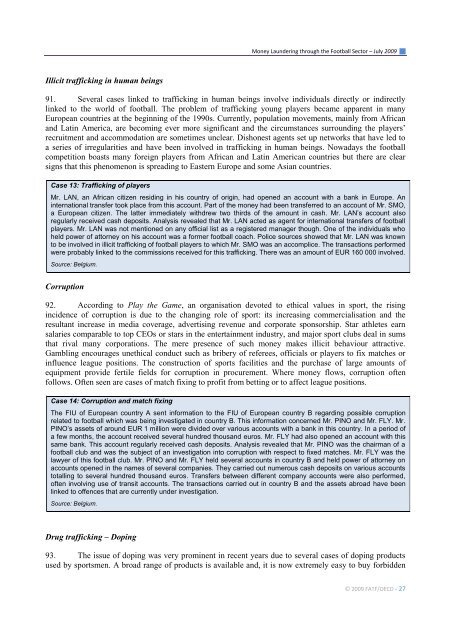Money Laundering through the Football Sector
Money Laundering through the Football Sector
Money Laundering through the Football Sector
You also want an ePaper? Increase the reach of your titles
YUMPU automatically turns print PDFs into web optimized ePapers that Google loves.
Illicit trafficking in human beings<br />
<strong>Money</strong> <strong>Laundering</strong> <strong>through</strong> <strong>the</strong> <strong>Football</strong> <strong>Sector</strong> – July 2009 <br />
91. Several cases linked to trafficking in human beings involve individuals directly or indirectly<br />
linked to <strong>the</strong> world of football. The problem of trafficking young players became apparent in many<br />
European countries at <strong>the</strong> beginning of <strong>the</strong> 1990s. Currently, population movements, mainly from African<br />
and Latin America, are becoming ever more significant and <strong>the</strong> circumstances surrounding <strong>the</strong> players‟<br />
recruitment and accommodation are sometimes unclear. Dishonest agents set up networks that have led to<br />
a series of irregularities and have been involved in trafficking in human beings. Nowadays <strong>the</strong> football<br />
competition boasts many foreign players from African and Latin American countries but <strong>the</strong>re are clear<br />
signs that this phenomenon is spreading to Eastern Europe and some Asian countries.<br />
Case 13: Trafficking of players<br />
Mr. LAN, an African citizen residing in his country of origin, had opened an account with a bank in Europe. An<br />
international transfer took place from this account. Part of <strong>the</strong> money had been transferred to an account of Mr. SMO,<br />
a European citizen. The latter immediately withdrew two thirds of <strong>the</strong> amount in cash. Mr. LAN‟s account also<br />
regularly received cash deposits. Analysis revealed that Mr. LAN acted as agent for international transfers of football<br />
players. Mr. LAN was not mentioned on any official list as a registered manager though. One of <strong>the</strong> individuals who<br />
held power of attorney on his account was a former football coach. Police sources showed that Mr. LAN was known<br />
to be involved in illicit trafficking of football players to which Mr. SMO was an accomplice. The transactions performed<br />
were probably linked to <strong>the</strong> commissions received for this trafficking. There was an amount of EUR 160 000 involved.<br />
Source: Belgium.<br />
Corruption<br />
92. According to Play <strong>the</strong> Game, an organisation devoted to ethical values in sport, <strong>the</strong> rising<br />
incidence of corruption is due to <strong>the</strong> changing role of sport: its increasing commercialisation and <strong>the</strong><br />
resultant increase in media coverage, advertising revenue and corporate sponsorship. Star athletes earn<br />
salaries comparable to top CEOs or stars in <strong>the</strong> entertainment industry, and major sport clubs deal in sums<br />
that rival many corporations. The mere presence of such money makes illicit behaviour attractive.<br />
Gambling encourages unethical conduct such as bribery of referees, officials or players to fix matches or<br />
influence league positions. The construction of sports facilities and <strong>the</strong> purchase of large amounts of<br />
equipment provide fertile fields for corruption in procurement. Where money flows, corruption often<br />
follows. Often seen are cases of match fixing to profit from betting or to affect league positions.<br />
Case 14: Corruption and match fixing<br />
The FIU of European country A sent information to <strong>the</strong> FIU of European country B regarding possible corruption<br />
related to football which was being investigated in country B. This information concerned Mr. PINO and Mr. FLY. Mr.<br />
PINO‟s assets of around EUR 1 million were divided over various accounts with a bank in this country. In a period of<br />
a few months, <strong>the</strong> account received several hundred thousand euros. Mr. FLY had also opened an account with this<br />
same bank. This account regularly received cash deposits. Analysis revealed that Mr. PINO was <strong>the</strong> chairman of a<br />
football club and was <strong>the</strong> subject of an investigation into corruption with respect to fixed matches. Mr. FLY was <strong>the</strong><br />
lawyer of this football club. Mr. PINO and Mr. FLY held several accounts in country B and held power of attorney on<br />
accounts opened in <strong>the</strong> names of several companies. They carried out numerous cash deposits on various accounts<br />
totalling to several hundred thousand euros. Transfers between different company accounts were also performed,<br />
often involving use of transit accounts. The transactions carried out in country B and <strong>the</strong> assets abroad have been<br />
linked to offences that are currently under investigation.<br />
Source: Belgium.<br />
Drug trafficking – Doping<br />
93. The issue of doping was very prominent in recent years due to several cases of doping products<br />
used by sportsmen. A broad range of products is available and, it is now extremely easy to buy forbidden<br />
© 2009 FATF/OECD - 27


